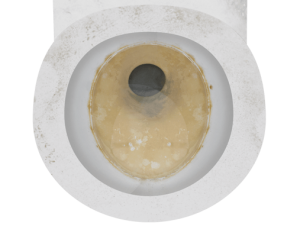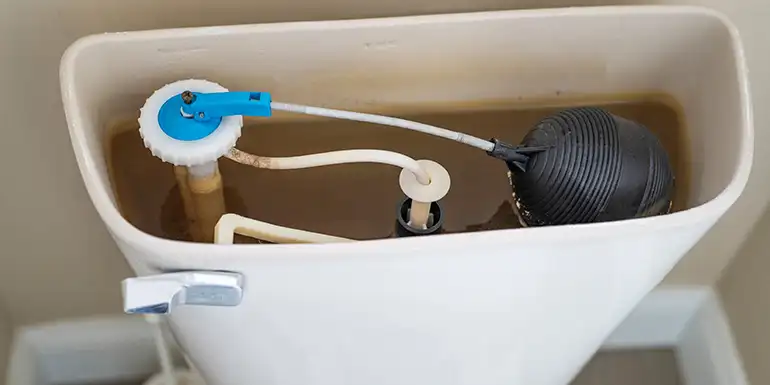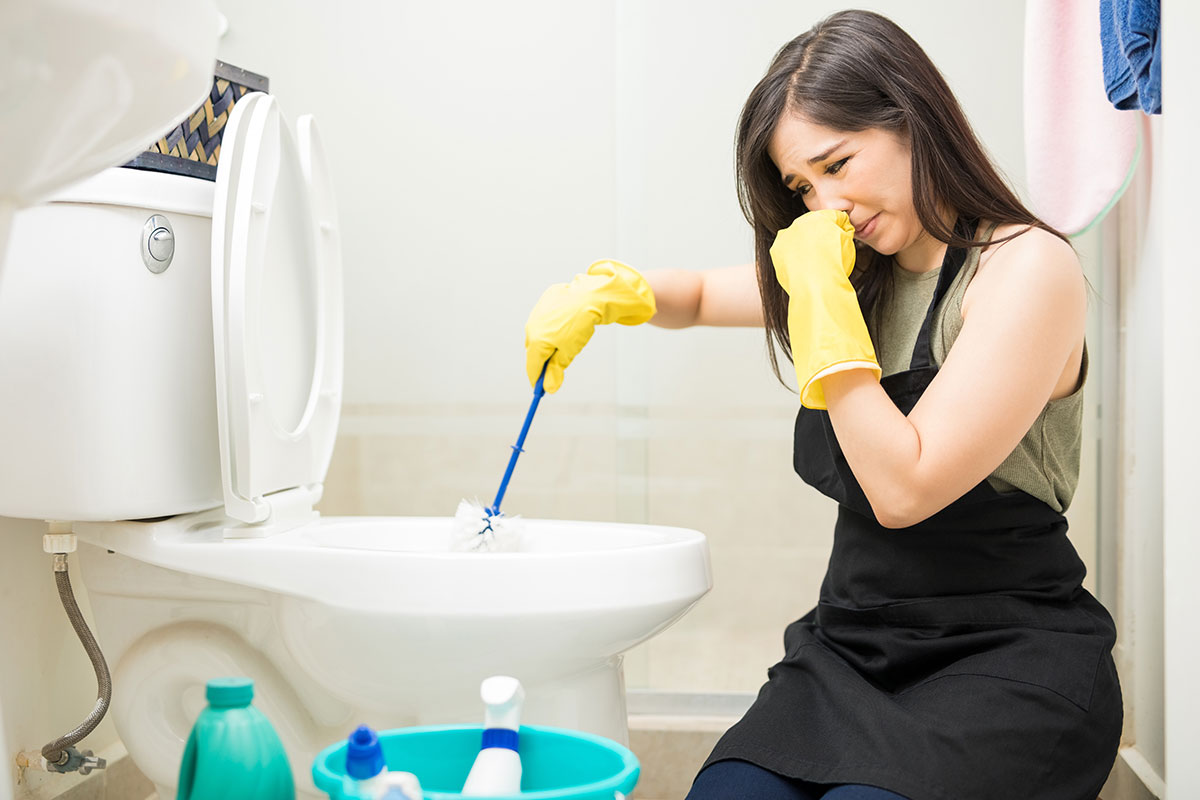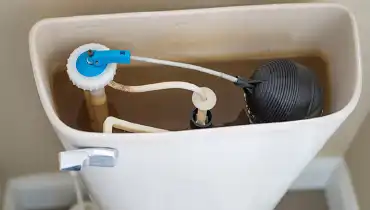Your toilet smells like rotten eggs due to the presence of hydrogen sulfide gas, which usually originates from bacterial growth in the drain or sewage system. This foul odor arises when these bacteria break down organic matter.
Encountering a smelly toilet can be an unpleasant experience, signaling something is amiss with your bathroom plumbing. A rotten egg odor typically points to hydrogen sulfide, a gas that forms when organic waste decomposes. This scenario is often linked to a dry P-trap, faulty wax ring, clogged vent pipe, or infrequent use of secondary bathrooms.
Regular cleaning may not always solve this issue if the underlying cause is deeper within the sewage system or related to water source contamination. Identifying the precise reason behind the stench is pivotal, not only to eliminate the odor but also to ensure your household’s sanitary safety. Addressing it promptly can prevent potential health hazards and maintain a fresh, odor-free bathroom environment.
Introduction To Unpleasant Toilet Odors
There’s nothing worse than walking into a bathroom and being greeted with a smell that turns your stomach. An unpleasant odor emanating from the toilet is not just a matter of poor aesthetics; it could signal deeper issues. This blog post dives into the potential causes of why your toilet smells like rotten eggs. We’ll explore common sources of these smells and the associated health risks. Our noses are powerful detectives, and sometimes, they detect more than we bargained for in our homes. Let’s solve this stinky mystery together!
Understanding The Common Sources Of Toilet Smells
Unwelcome smells from your toilet can be alarming. These scents are often a sign that something is amiss. Below are typical reasons why a toilet may start to smell of rotten eggs:
- Bacterial growth: Bacteria lurking in the drain or toilet bowl can create sulfurous smells.
- Sewer gas leaks: A damaged seal or a dry P-trap can allow sewer gases to escape.
- Vent pipe issues: Blocked or malfunctioning vent pipes might result in odors.
- Water contamination: Contaminated water can also contribute to foul odors.
Identifying the source is the first step to tackling these odors and ensuring a fresh-smelling bathroom.
Overview Of Health Risks Associated With Foul Odors
Health risks from foul odors can be a concern. Persistent bad smells may indicate the presence of harmful substances or poor air quality. Here’s a quick overview of the potential health effects:
| Symptom | Possible Cause |
|---|---|
| Headaches | Exposure to sewer gases |
| Nausea | Inhalation of toxic bacteria |
| Respiratory issues | Poor air quality |
It’s important to address any foul smells quickly to promote a healthy home environment.
The Science Behind The Rotten Egg Smell
The unpleasant smell of rotten eggs in toilets is a warning sign. It points to a problem that should not be ignored. Understanding the science behind this odor can help address the issue effectively.
Chemical Composition Of Hydrogen Sulfide Gas
The main culprit for the rotten egg smell is a gas called hydrogen sulfide (H2S). This gas is generated when bacteria break down organic matter under low-oxygen conditions. Hydrogen sulfide gas has a distinct, foul odor, even at low concentrations.
- Colorless Gas: Invisible to the eye, yet noticeable by smell.
- Highly Flammable: It poses a risk if concentration levels are high.
- Soluble in Water: Can be transported through water systems.
Link Between Hydrogen Sulfide And Sewerage Systems
Sewerage systems provide the perfect environment for hydrogen sulfide production. Waste materials and lack of oxygen create ideal conditions for bacteria to thrive. These bacteria produce hydrogen sulfide gas as waste.
| Condition | Result |
|---|---|
| Organic Decay | Production of H2S Gas |
| Stagnant Water | Further bacterial growth |
| Poor Ventilation | Gas accumulation |
To take action, identify the source of the smell. Regular cleaning, good ventilation, and fixing leaks can prevent odor problems. If the smell persists, a professional plumber might need to inspect the system.
Common Causes Of Rotten Egg Smell In Toilets
Experiencing a rotten egg smell from your toilet can be alarming and unpleasant. Many homeowners wonder what causes this sulfuric stench. Often, the odor points to issues within the plumbing system. Understanding common causes can help address and prevent the smell.
Dry P-traps And Their Role In Allowing Sewer Gases To Escape
P-traps are curved pipes under your toilet. They hold water to block sewer gases. If a toilet is rarely used, the water in the trap can evaporate. This allows foul-smelling gases to enter your home. Signs include a dry bowl or a gurgling sound. Regular flushing can prevent P-traps from drying out.
Bacterial Growth In The Drain Lines
Bacteria thrive in moist environments, like toilet drains. Organic materials, like human waste, feed these bacteria. Over time, they create hydrogen sulfide, which resembles a rotten egg scent. Cleaning agents and methods designed for toilet drains can control bacteria growth.
Breakdown Of Waste Causing Sulfur-related Odors
Waste naturally contains sulfur compounds. When waste breaks down, it releases hydrogen sulfide gas. This process is normal, but odors should stay within the sewage system. A strong odor in your bathroom might indicate a vent pipe issue. This pipe regulates air pressure and removes gases from the sewage system. A blockage can force gases back through the toilet, causing the smell.
Identifying The Source Of The Smell
Encountering a rotten egg smell in your bathroom can be unsettling.
It’s crucial to find where this stink originates.
Several issues ranging from simple to complex could cause this smell.
Let’s delve into various inspection methods.
Inspection Techniques For Toilets And Plumbing
Detecting the exact issue with your toilet demands attention.
Start with the basics; give your toilet a complete check.
- Look inside the tank for any signs of mold.
- Check the bowl for stagnant water or residue.
- Examine the base where the toilet meets the floor.
- Inspect the wax seal for any damage or leaks.
- Sniff around fittings and pipes for concentrated odor.
Remember, a thorough inspection can pinpoint many issues!
Using Household Items To Detect Leaks
Simple household items can reveal hidden leaks.
Food coloring and water are all you need.
- Drop a few food coloring drops into the tank.
- Wait for about 30 minutes without flushing.
- Check if color appears in the bowl — a sure leak sign.
Another method involves using vinegar.
- Mix vinegar with water
- Wipe around the base and watch for bubbling, indicating a leak.
These easy tests can save you from big troubles later.
Impact Of Water Source On Toilet Odor
Toilet odors can turn a clean bathroom into a place you avoid. Water sources play a big role in this smell. Let’s dive in to understand why your toilet might smell like rotten eggs and what to do.
Role of Well Water in OdorRole Of Well Water And Sulfate Concentration
Private wells might affect your toilet’s smell. These are steps in well water leading to smell:
- Well water collects minerals and gases.
- Sulphates in water turn into hydrogen sulfide gas.
- This gas rises and gives off a rotten egg smell.
Get your well water tested. Look at sulfate levels. A high level can cause stink.
Poor Water Quality Contribution to SmellsPoor Water Quality And Its Contribution To Foul Smells
Bad smells also come from poor water quality. Here’s why bad water smells:
- Scum builds up due to minerals and bacteria.
- Dirty water traps odors.
- Old pipes add metallic smells.
Filtration systems clean bad smells from water. Regular maintenance stops odors coming back. Understanding your water source can make your toilet smell fresh.

Credit: www.culligannation.com
Health Implications Of Exposure To Rotten Egg Smell
Encountering the smell of rotten eggs in your home can be alarming. Often, this pungent odor indicates the presence of hydrogen sulfide, a gas that can emanate from your toilet due to bacterial decomposition in the sewage system or a broken vent pipe. Not only is the smell unpleasant, but prolonged exposure may also have implications for your health.
Potential Health Issues Related To Hydrogen Sulfide Exposure
Hydrogen sulfide is infamous for its foul stench, sometimes compared to rotten eggs. Prolonged exposure to this gas, even at low levels, can have various health effects. Some common symptoms include:
- Eye irritation: Stinging sensation or redness.
- Respiratory problems: Coughing or shortness of breath especially in those with asthma.
- Headaches and dizziness: Due to lack of oxygen.
- Nausea: A common reaction to strong odors.
Long-term exposure at higher concentrations can lead to more serious issues such as:
- Loss of smell.
- Memory loss or fatigue.
- Extreme respiratory distress.
When To Seek Professional Help
Immediate action is crucial if the rotten egg smell persists. Seek professional help:
| Condition | Action to Take |
|---|---|
| Symptoms of exposure | Consult a physician right away. |
| Ongoing odor | Contact a plumber to inspect and resolve sewage issues. |
| Odor post plumbing fix | Recheck with the plumber or seek another professional opinion. |
It’s essential to ensure timely intervention to mitigate potential health risks and restore air quality in your home.
Preventive Measures To Combat Toilet Odors
Let’s explore how to keep toilet odors at bay. A smelly toilet can turn any bathroom into an unpleasant space. But, fear not! With simple measures, a fresh-smelling bathroom awaits.
Regular Cleaning And Maintenance
Cleanliness is the first line of defense against bad odors. Follow these steps:
- Weekly scrubbing: Use a brush and disinfectant. Target the bowl, rim, and hidden areas.
- Flush after use: This simple act prevents odor buildup.
- Check for leaks: A quick look around the toilet for any signs of leaking is essential.
- Inspect seals: Ensure the wax seal under the toilet isn’t broken.
Remember, regular attention reduces the chance of odor-causing issues.
Using Water Softeners And Filtration Systems
| Method | Benefits |
|---|---|
| Water Softeners |
|
| Filtration Systems |
|
Hard water often contributes to smelly toilets. It leads to mineral deposits that harbor bacteria. Water softeners and filtration systems play a key role in tackling this problem. They ensure water is clean, reducing the risk of bacteria growth and associated smells.

Credit: www.mrrooter.ca
Diy Solutions For Eliminating Rotten Egg Smell
Encountering a rotten egg smell in your bathroom is far from pleasant. This foul odor often signals an issue with your sewage system or water supply. Simple household remedies and cleaners can help combat this problem. Explore these DIY solutions to rid your toilet of that unwelcome sulfuric stench.
Natural Remedies Using Household Supplies
Natural products can be powerful allies in eliminating odors. Here’s how you can use them:
- Baking soda and vinegar: Pour 1 cup of baking soda followed by 1 cup of vinegar into the toilet. Allow it to fizz and sit for 20 minutes, then flush.
- Lemon juice: Its acidity breaks down odor-causing bacteria. Squeeze half a lemon into the bowl, let it sit, and then scrub.
- Boiling water: Sometimes a simple flush with boiling water can remove the buildup causing the smell.
Chemical Cleaners And Safety Precautions
Chemical cleaners offer a powerful punch to stubborn odors. Remember these safety tips:
- Always wear gloves and goggles to protect your skin and eyes.
- Never mix different chemicals. This can produce dangerous gases.
- Read labels for proper usage and safety instructions.
For a deep clean, consider using a specialized toilet bowl cleaner. Apply it according to the instructions, let it sit, then scrub with a brush and flush.
Professional Remedies And Services
The smell of rotten eggs coming from your toilet is unpleasant. It often signals a problem that needs immediate attention. This section explores proven professional remedies and services. These help to ensure a fresh, odor-free bathroom environment.
When To Call A Plumber
Do not ignore persistent bad smells. They indicate serious issues such as a sewer gas leak. Warning signs demanding a plumber’s expertise include:
- Gurgling sounds from drains or toilet
- Water backups in the sink or bathtub
- Odors persisting after thorough cleaning
A certified plumber will identify and remedy the source of the smell. They ensure your sanitary system functions properly.
Advanced Plumbing Services For Persistent Odor Issues
Sometimes, deeper investigation is necessary if the odor persists. Advanced plumbing services involve:
| Service | Description |
|---|---|
| Hydro-jetting | High-pressure cleaning to remove blockages |
| Video inspection | Camera use to spot hard-to-see issues |
| Repair or replace | Fixing or changing damaged pipes |
These steps eliminate stubborn odors by tackling hidden problems. Specialists use state-of-the-art tools for a lasting solution.

Credit: rainaldihomeservices.com
Technological Advancements In Odor Elimination
Does your toilet emit a foul, rotten egg smell? Fear not, as modern technology has come to the rescue. With impressive advancements, unpleasant bathroom odors can now be a thing of the past. Cutting-edge devices and revolutionary toilet designs actively combat those pesky smells, making your bathroom experience fresher than ever.
Latest Tools And Equipment For Diagnosing Toilet Smells
Banishing bad odors starts with finding the source. The latest diagnostic tools are here to help:
- Electronic Nose Devices: Pinpoint odors with high-tech sensors.
- Smoke Machines: Reveal hidden leaks by pumping harmless smoke through pipes.
- UV Fluorescent Tracers: Detect sewage gas leaks by revealing invisible gases.
Professionals now use sophisticated equipment to quickly identify and tackle the culprit behind that rotten egg smell in your toilet.
Innovations In Toilet Design To Prevent Odors
New toilet designs stop odors before they start. Here’s how:
| Design Innovation | Odor Elimination Method |
|---|---|
| Integrated P-Trap | Keeps a water seal to block sewer gases. |
| Touchless Flushing | Limits odor spread by reducing surface contact. |
| Air Purifying Filters | Neutralizes odors within the toilet bowl. |
| Rimless Toilet Bowls | Prevents buildup of smelly bacteria. |
Each design leap forward provides an effective shield against the invasion of unpleasant odors into our personal spaces.
Conclusion: Ensuring A Fresh And Odor-free Bathroom
Dealing with a bathroom that smells like rotten eggs can be unpleasant. Understanding the causes and solutions is key to tackling this issue. Let’s ensure your bathroom stays fresh and welcoming.
Summarizing Key Takeaways
- Bad odors often come from bacterial growth in your drain or toilet.
- A damaged toilet seal or p-trap can allow sewer gas into your home.
- Regular cleaning and maintenance eliminate and prevent foul smells.
- Professional help may be necessary for persistent odor problems.
Proactive Steps For Long-term Odor Prevention
- Clean your toilet regularly with the right products.
- Check seals and gaskets for signs of wear and tear.
- Flush drains with a mixture of baking soda and vinegar monthly.
- Address water quality issues to prevent sulfur smells.
- Seek professional plumbing services for repairs and inspections.
Remember, prevention is easier than cure. Take proactive steps today to keep your bathroom smelling fresh!
Frequently Asked Questions On Why Does My Toilet Smell Like Rotten Eggs
What Causes A Toilet To Smell Like Sulfur?
The smell of rotten eggs from a toilet is often due to bacteria in the water or drain that produce hydrogen sulfide gas. This can arise from a dry P-trap, sewer backflow, or contaminated water supply. Regular cleaning and addressing plumbing issues usually solves the problem.
Can A Toilet Leak Cause Bad Odors?
Yes, a leak around the toilet’s base can cause odors. The leak allows water and sewer gases to escape, often resulting in a rotten egg smell. It’s important to fix the leak promptly to prevent water damage and remove the unpleasant smell.
How Do I Eliminate Sulfur Odors In My Bathroom?
To remove sulfur odors, clean the toilet thoroughly, including the bowl, tank, and base. Use a mixture of water and white vinegar for cleaning, and pour it down the overflow tube to eliminate bacteria. If the smell persists, check for leaks or call a plumber.
Is A Smelly Toilet A Health Hazard?
A smelly toilet can indicate the presence of harmful sewer gases like hydrogen sulfide. In high concentrations, these gases are health hazards. It’s best to ventilate the area and address the underlying plumbing problem to ensure safety.
Conclusion
Navigating through the stench of sulfur in your bathroom can be daunting. Understanding the cause is your first step to fresh air. Regularly clean your drains, check for leaks, and consult a plumber if needed. Acting swiftly can transform your bathroom from foul to fresh, ensuring a pleasant and odor-free environment.
Remember, a fresh bathroom is a happy bathroom!

